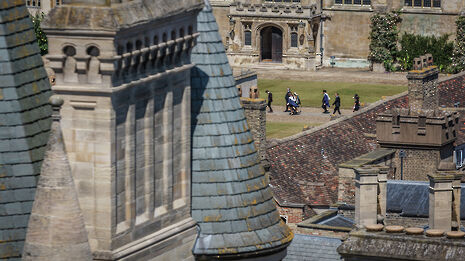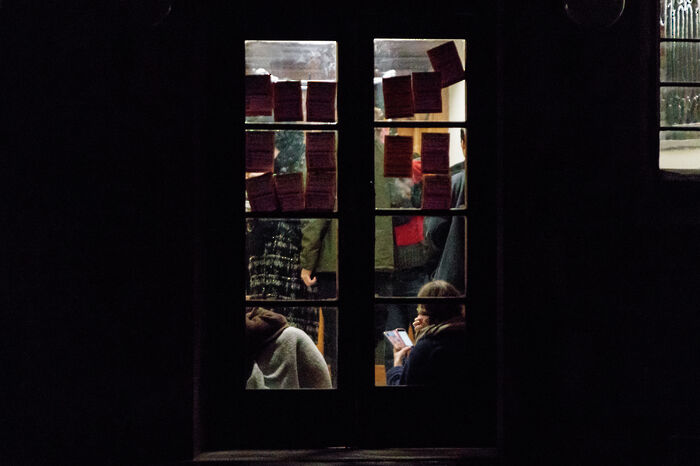Fill in the blanks in Cambridge’s history by challenging what you are told
Cambridge has a long and rich history. Stella Swain explains why we should remain critical of the narratives we are fed upon matriculating

Freshers’ week is a time when Cambridge really revels in its history; new students are inundated with information about the prominence of their college and its past within the University, and constantly reminded of the legacy that they have somehow become part of. This process can in itself be alienating for those who do not fit the mould set out for them by hundreds of years of ‘traditions’.
Navigating this new world of gowns and formal dinners and drinking to the Queen - and even to ‘Sir Winston’, if you happen to be joining me at Churchill College - is not just disorienting. It’s also designed to other, to make sure that those that hold the power in institutions like this maintain their control. But these feelings of alienation do not have to be brushed away or overcome: they can be sources of great strength and opportunities to learn and build collectively to dismantle these historic systems of exclusion.
Do not be afraid to disorient yourself within Cambridge, and to choose to centre the histories that the University does not tell
Joining the University does not have to mean accepting or becoming complicit in this institution’s practices. If anything, our privileged position as current students with access to its resources should encourage us to challenge the image the University paints of its values and histories, and hold it to account where we can.
For every tale of university excellence or of Cambridge’s ‘special role’ in the world, we must pause to consider those histories that are not being told, those that are actively suppressed, and the motivations behind the stories that are perpetuated. It is vitally important that we recognise which narratives are being rehearsed to new students, and which voices are being erased in the process of ‘orienting’ us within the institution.
As we enter our first weeks of term, we’re often reminded of the students that - often literally - walked these steps before us. But while Cambridge’s star-studded alumni lists make much of the Isaac Newtons, John Maynard Keynes and Charles Darwins, there are far fewer faces that are black or female, disabled or queer. According to the Victoria and Albert museum’s research, the first black student attended Cambridge in 1758, but Francis Williams doesn’t appear in the University’s records. Fast forward over two hundred and fifty years, and between 2012 and 2016, 6 of Cambridge’s 29 undergraduate colleges admitted fewer than 10 British BME students.
Even if we only look at the last academic year, students have witnessed and been the target of the right-wing press, with repeated vitriolic attacks on those daring to suggest that Cambridge broaden the scope of its teaching. Learning about those without white, male and Eurocentric names can only enrich our studies, and can also give us the tools needed to critique the University’s legacies of oppression. It is as important as ever to celebrate and protect those fighting to make these changes.
Student movements have repeatedly forced change against the odds
However, as university fees increase and the ‘student experience’ becomes increasingly commodified, it is all too easy to see how the project of decolonisation itself can be turned into a check-box to be fulfilled with the tokenistic inclusion of ‘diverse’ names, while ignoring the fundamental injustices at the heart of the institution. ‘Diversity’ becomes co-opted into another way that the University can compete in the marketplace of higher education. It is therefore vitally important not only to undertake the work of decolonising within the University, but to actively deconstruct these institutions that are built to exclude.
This can all feel overwhelming to say the least, but although Cambridge is steeped in historic and continued oppression, we are also joining a legacy of hope and resistance. Student movements have repeatedly forced change against the odds, and new freshers are entering Cambridge at a time when campaigns towards a more truly democratic university are building in strength. In March this year, student solidarity for the pensions strikes involved the coming together of various different groups to create their vision of a just university.
Among their points were calls for fairer rents, a decolonised curriculum, and an end to the university’s investment in fossil fuel industries. They are part of a history that you probably won’t find in your freshers’ guide – that of Cambridge activism. From the anti-war protests and rent strikes of the 1960s and the ‘Garden House Riot’ of 1971, to the protests against fee increases in 2010 and 2011, students of Cambridge have found that they do have power when they join together to push for a common cause.
When we centre the voices that have been marginalised in our studies, those whose knowledge has not been valued by the academy because they were female, or black, or too poor to access the university; when we remember that we are not alone in feeling disoriented within Cambridge– we can see that Cambridge’s is a history of continued oppression but also one of resistance. The bottom line is that you do not have to become ‘oriented’ within Cambridge. Your feelings of alienation can be a source of strength, solidarity, and hope, and equip you to think critically about the institution that you are now a part of. Do not be afraid to disorient yourself within Cambridge, and to choose to centre the histories that the university does not tell. I promise you’ll be in good company.
 Comment / Plastic pubs: the problem with Cambridge alehouses 5 January 2026
Comment / Plastic pubs: the problem with Cambridge alehouses 5 January 2026 News / Cambridge businesses concerned infrastructure delays will hurt growth5 January 2026
News / Cambridge businesses concerned infrastructure delays will hurt growth5 January 2026 News / New movement ‘Cambridge is Chopped’ launched to fight against hate crime7 January 2026
News / New movement ‘Cambridge is Chopped’ launched to fight against hate crime7 January 2026 News / AstraZeneca sues for £32 million over faulty construction at Cambridge Campus31 December 2025
News / AstraZeneca sues for £32 million over faulty construction at Cambridge Campus31 December 2025 Interviews / You don’t need to peak at Cambridge, says Robin Harding31 December 2025
Interviews / You don’t need to peak at Cambridge, says Robin Harding31 December 2025










